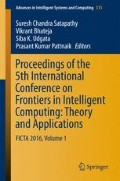Abstract
The algorithm presented in this paper deals with use of soft computing technique of Fuzzy logic applied with dynamic graph theory to create graphs which can be efficient in resource allocation process in varied environments, i.e., software project management, operating systems, construction models, etc. The algorithm implies one unique factor of dynamicity which makes graph of resource allocation evolving even after primary design due to chaotic nature of the afore mentioned nature of environments. The use of Fuzzy imparts a logical inference mechanism which rules out non-monotonous reasoning perspective of this dynamicity. The algorithm is robust and adaptive to varied environments. The proposed algorithm will be beneficial for more accurate Engineering in terms of reducing the failures and being more specific in answering the allocation of the resources and how the work has to be undertaken using those resources. It will also emphasize on devising a model which can be adhered to with the proper follow ups such that it could be referred to at the time of chaos or failures. “The development of the Algorithm will be much more product centric and will stick to developer’s view of development along with customer’s view of required functionalities.”
Access this chapter
Tax calculation will be finalised at checkout
Purchases are for personal use only
References
Konig, M.D., Battiston, S., Napoletano, M. And Schweitzer, F., “On Algebraic Graph Theory and the Dynamics of Innovation Networks”, Networks and Heterogeneous Media, Volume 3, Number 2, June (2008)
Shai, O., Preiss, K., “Graph theory representations of engineering systems and their embedded knowledge”, Artificial Intelligence in Engineering, Elsevier, Vol 13(1999)
Toffetti, G., Pezze, M., “Graph transformations and software engineering: Success stories and lost chances”, Journal of Visual Languages and Computing, Elsevier, Vol 24(2013)
Konig, M.D., “Dynamic R&D Networks - The Efficiency and Evolution of Interfirm Collaboration Networks”, Dissertation – 18182, ETH ZURICH (2010)
Boccaletti, S., Grebogi, C., Lai, Y.C., Mancini, H., Maza, D., “The Control of Chaos: Theory and Applications”, S. Boccaletti et al. / Physics Reports 329, Elsevier (2000)
Chong, C.Y., Lee, S.P., “Analyzing maintainability and reliability of object oriented software using weighted complex network”, The Journal of Systems and Software, Elsevier, Vol 110(2015)
Attri, R., Grover, S., Dev, N., “A graph theoretic approach to evaluate the intensity of barriers in the implementation of total productive maintenance (TPM)”, International Journal of Production Research, Taylor and Francis (2013)
Schweitzer, F., Fagiolo, G., Sornette, D., Redondo, F.V., White, D.R., “Economic Networks: What do we know and what do we need to know?”, ACS - Advances in Complex Systems, Vol 12, Number 4(2009)
Robinson, H., “Graph Theory Techniques in Model-Based Testing”, International Conference on Testing Computer Software (1999)
Lane, P.C.R., Gobet, F., “A theory-driven testing methodology for developing scientific software”, Journal of Experimental & Theoretical Artificial Intelligence, Taylor & Francis (2012)
Saini, D. K., Ahmad, M., “Software Failures and Chaos Theory”, WCE -London, Vol II (2012)
Schmidt, R., “Software engineering: Architecture-driven Development”, NDIA 15th Annual Systems Engineering Conference, October (2012)
Jifeng, H., Li, X., Liu, Z., “Component-Based Software Engineering-The Need to Link Methods and their Theories”, 973 project 2002CB312001 of the Ministry of Science and Technology of China
Boehm, B., “Value-Based Software Engineering: Overview and Agenda”, USC-CSE-2005-504, February (2005)
Dybå, T., Kitchenham, B.A., Jørgensen, M., “Evidence-Based Software Engineering for Practitioners”, IEEE Software, Published by the IEEE Computer Society, January-February (2005)
Kelly, D., “Scientific software development viewed as knowledge acquisition: Towards understanding the development of risk-averse scientific software” The Journal of Systems and Software, Elsevier, Vol 109(2015)
Kumar, G., Bhatia, P.K., “Neuro-Fuzzy Model to Estimate & Optimize Quality and Performance of Component Based Software Engineering”, ACM SIGSOFT Software Engineering Notes, Vol 40(2015)
Mishra, S., Sharma, A., “Maintainability Prediction of Object Oriented Software by using Adaptive Network based Fuzzy System Technique”, International Journal of Computer Applications, Vol 119(2015)
Tyagi, K., Sharma, A., “A rule-based approach for estimating the reliability of component-based systems”, Advances in Engineering Software, Elsevier, Vol 54 (2012)
Author information
Authors and Affiliations
Corresponding author
Editor information
Editors and Affiliations
Rights and permissions
Copyright information
© 2017 Springer Nature Singapore Pte Ltd.
About this paper
Cite this paper
Saini, G.S., Dubey, S.K., Bharti, S.K. (2017). Fuzzy-Based Algorithm for Resource Allocation. In: Satapathy, S., Bhateja, V., Udgata, S., Pattnaik, P. (eds) Proceedings of the 5th International Conference on Frontiers in Intelligent Computing: Theory and Applications . Advances in Intelligent Systems and Computing, vol 515. Springer, Singapore. https://doi.org/10.1007/978-981-10-3153-3_7
Download citation
DOI: https://doi.org/10.1007/978-981-10-3153-3_7
Published:
Publisher Name: Springer, Singapore
Print ISBN: 978-981-10-3152-6
Online ISBN: 978-981-10-3153-3
eBook Packages: EngineeringEngineering (R0)

